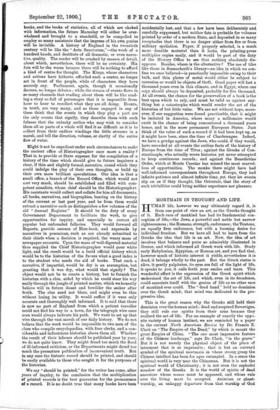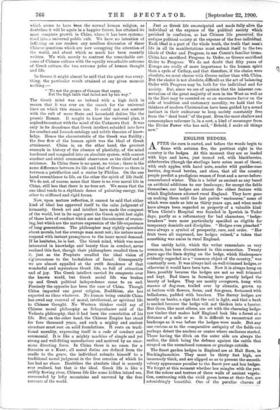MORTMAIN IN THOUGHT AND LIFE.
HUMAN life, however we may ultimately regard it, is from one point of view an art, as the Greeks thought of it. Each race of mankind has had its fundamental con- ception of life,—the Jews, a powerful and noble but narrow righteousness ; the Romans, strength, endurance; the Teutons, an equally firm endurance, but with a burning desire for individual freedom. But we have all had to learn from the Greeks the idea that life is an art. Now, the idea of art involves that balance and poise so admirably illustrated in Greece, and which informed all Greek work with life. Study early Babylonian, Egyptian, or Roman art, and you find that, however much of historic interest it yields, nevertheless it is dead, it belongs wholly to the past. But the Greek statue is alive, it gently palpitates, its eyes are full of the light of life, it speaks to you, it calls forth your smiles and tears. This wonderful effect is the expression of the Greek spirit which understood the art of life, and which, even in its decadence, could associate itself with the genius of life as no other race of mankind ever could. The "dead hand" held no dominion over the Greek mind; that mind was dedicated to the pro- gressive idea.
This is the great reason why the Greeks still hold their dominion over the human mind ; dead and aceptred Sovereigns, they still rule our spirits from their urns because they realised the art of life. For an example of exactly the oppo- site variety of human instinct, we are reminded by a paper in the current North American Review by Dr. Francis E. Clark on "The Empire of the Dead," by which is meant the great Empire of China. "The one most impressive feature of the Chinese landscape," says Dr. Clark, "is the grave." But it is not merely the physical object of the place of interment that is so impressive; that is but an outward symbol of the spiritual mortmain in whose strong grasp the Chinese intellect has been for ages entangled. In a sense the spiritual world is very near the Chinaman. But it is not the spiritual world of Christianity; it is not even the asphodel meadow of the Greeks. It is the world of spirits of dead ancestors whose manes must be appeased, and whose rule over the living must be accepted. Animism or ghost- worship, an unhappy departure from that worship of God which seems to have been the normal human religion, as doubtless it will be again in a happier future, has attained its most complete growth in China, where it has been systema- tised into a universal public cult. We have no intention of inflicting on our readers any needless discussion of those Chinese questions which are now occupying the attention of the world, and about which so much has been recently written. We wish merely to contrast the remarkable out- come of Chinese culture with the equally remarkable outcome of Greek culture, the two extreme poles of human thought and life.
In Greece it might almost be said that the quest was every- thing, the particular result attained at any given moment nothing :— " 'Tis not the grapes of Canaan that repay, But the high faith that failed not by the way."
The Greek mind was so imbued with a high faith in reason that it was ever on the search for the universal lines on which this reason ran. It could not rest content with the cult of mere State and household deities like the prosaic Roman. It sought to know the universal plan, it aspired to contact with the mind of the Unknown God. It was only in its decadence that Greek intellect subsided into laws for conduct and forsook ontology and subtle theories of know- ledge. Hence the characteristic of the Greek was fluidity ; the free flow of the human spirit was the ideal of Greek attainment. China is, on the other hand, the greatest example in history of the absence of plasticity, of the mind hardened and congealed into an absolute system, with correct conduct and strict ceremonial observance as the chief end of existence. In China there is no quest, no vision ; there is the same difference between its life and that of Greece as there is between a petrifaction and a statue by Phidias. On the one hand resemblance to life, on the other the spirit of life itself. We do not, of course, mean that there is no true moral life in China, selfless that there is no true art. We mean that the one ideal tends to a rhythmic dance of pulsating energy, the other to stiffened and rigid forms.
Now, upon mature reflection, it cannot be said that either kind of ideal has approved itself to the calm judgment of humanity. Greek art and intellect have made the conquest of the world, but in its eager quest the Greek spirit lost sight of those laws of conduct which are not the outcome of reason- ing, but which are the mature expression of the life-experience of long generations. The philosopher may rightly speculate about morals, but the average man must not; his nature must respond with instant promptness to the inner moral demand. If he hesitates, he is lost. The Greek mind, which was more interested in knowledge and beauty than in conduct, never realised this fact, though their philosophers recalled them to it, just as the Prophets recalled the ideal vision of righteousness to the backsliders of Israel. Consequently we are almost appalled at the swift decadence of that wonderful and mysterious Greek life, so full of attraction gad of joy. The Greek intellect carried its conquests over the known world, but Greek social life was broken up and Greek political independence came to an end. Precisely the opposite has been the case of China. Though China imported one great religion, Buddhism, she has exported no ideas whatever. No human being outside China has owed any renewal of moral, intellectual, or spiritual life to Chinese thought. No Western thinker could say of Chinese moral philosophy as Schopenhauer said of the Vedanta philosophy, that it had been the consolation of his life. But, on the other hand, the Chinese Empire has stood for four thousand years, and such a mighty and ancient structure must rest on solid foundations. It rests on tradi- tional morality, expressing itself in a code of conduct and ceremonial. It is like a mighty machine of simple and yet strong and well-fitting manufacture and motived by an enor- mous directing force. In China there is no room for a Socrates or a Kant; all moral duties are defined from the cradle to the grave, the individual submits himself to a traditional moral judgment in the free creation of which he has had no share. Doubtless the absolute ideal is scarcely ever realised, but that is the ideal. Greek life is like a swiftly flowing river, Chinese life like some hidden inland sea, surrounded by lofty mountains and unvexed by the free currents of the world. Just as Greek life emancipated and made fully alive the individual at the expense of the political society which perished in confusion, so has Chinese life preserved the antique political society at the expense of the free individual. Each ideal is a part of the whole truth, the truth that man's life in all its manifestations must submit itself to the two ideals of Order and Progress, to use Comte's familiar terms. China has sacrificed Progress to Order, as Greece sacrificed Order to Progress. We do not doubt that fifty years of Europe are really of more importance to the human spirit than a cycle of Cathay, and that therefore, if the choice were absolute, we must choose with Greece rather than with China. But the choice is not absolute, difficult as the art of balancing Order with Progress may be, both for the individual and for society. But, since we are of opinion that the inherent con- servatism of the great majority of men in the West as well as in the East may be counted on as an enormous factor on the side of tradition and customary morality, we hold that the thinkers of modern Christendom have been guided by a sound instinct in their endeavour to keep society constantly free from the "dead hand "of the past. Even the most shallow and commonplace reformer is, in a sort, a kind of messenger from the Divine Power who has said, "Behold, I make all things new."







































 Previous page
Previous page